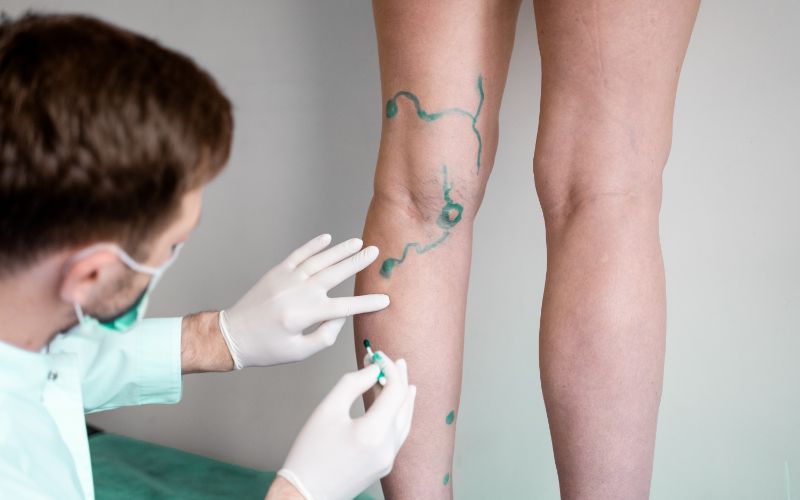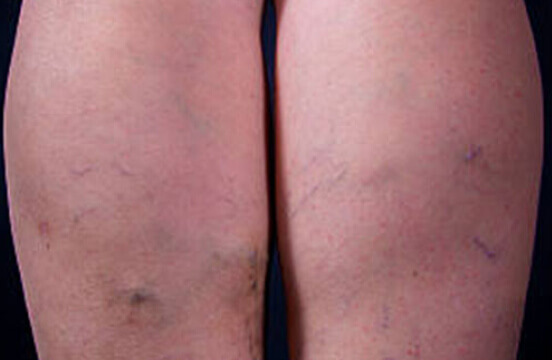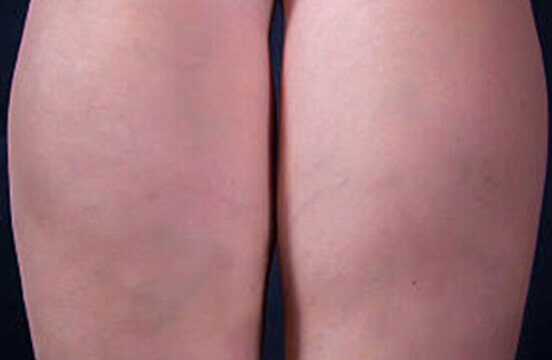Treat Vein Conditions at Suburban Vein Center
If you or a loved one is struggling with venous ulcers, it’s essential to seek the guidance of an experienced vein doctor like Dr. Zmily, a renowned specialist in Michigan. Venous ulcers are a common and often painful condition caused by underlying venous insufficiency.
What Are Venous Ulcers?
Venous ulcers, also known as stasis ulcers or venous stasis ulcers, are open sores that typically develop on the lower legs or ankles. They result from poor blood circulation in the veins, particularly in the legs. These ulcers usually form due to underlying venous insufficiency, which occurs when the valves in the veins fail to pump blood back to the heart efficiently. They can take several months to heal, or in rare cases, fail to heal.
Venous Ulcer Causes
Venous ulcers primarily stem from chronic venous insufficiency (CVI), which can be caused by several factors. The most common contributors include:
- Deep Vein Thrombosis (DVT): A blood clot that forms in the deep veins of the leg.
- Varicose Veins: Enlarged and twisted veins that hinder proper blood flow.
- Obesity: Excessive weight can put additional pressure on the veins.
- Prolonged Inactivity: Lack of movement or long periods of sitting or standing can impede blood circulation.
- Aging: The natural aging process can weaken the veins and valves, leading to venous insufficiency.
- Previous Leg Injury: Trauma or damage to the leg can affect blood flow and increase the risk of venous ulcers.

Symptoms of Venous Ulcers
If you’re suffering from a venous ulcer, you may notice the following symptoms:
- Pain or discomfort in the affected leg.
- Swelling (edema) in the lower leg and ankle.
- Skin discoloration, typically dark or reddish-brown patches.
- Itching or a feeling of tightness in the affected area.
- Thickened and hardened skin around the ulcer.
- Open, non-healing sores, often with a weeping or oozing wound bed.
For those experiencing any of the symptoms mentioned above, see a vein specialist for diagnosis. Dr. Zmily is a board-certified cardiologist who provides quality vein care to patients in Troy, Taylor, Detroit, and Rochester, Michigan.
What Do Venous Ulcers Look and Feel Like?
Venous ulcers can vary in appearance and sensation. They’re typically shallow with irregular edges and a moist base. The surrounding skin may be discolored, inflamed, and feel warm to the touch. The ulcers can be painful, particularly when walking or standing, and may have a foul odor due to the presence of bacteria.
Venous Ulcer Treatments
Proper diagnosis and treatment of venous ulcers are essential to promote healing and prevent complications. Treatment options may include:
- Compression Therapy: Wearing specially designed compression stockings or bandages to improve blood flow and reduce swelling.
- Wound Care: Cleaning and dressing the ulcer with appropriate dressings to promote healing.
- Medications: Topical or oral medications may be prescribed to manage pain, inflammation, or infection.
- Venous Interventions: In cases where venous insufficiency is the underlying cause, minimally invasive procedures like endovenous laser treatment (EVLT) or sclerotherapy may be recommended to close or remove faulty veins.
- Lifestyle Modifications: Adopting a healthy lifestyle, including regular exercise, maintaining a healthy weight, and elevating the legs, can improve blood circulation and reduce the risk of ulcer recurrence.
Venous Ulcer Prevention
Preventing venous ulcers involves addressing the underlying causes and managing risk factors. Here are some preventive measures to consider:
- Regular Exercise: Engage in activities that promote leg muscle strength and improve blood circulation.
- Weight Management: Maintain a healthy weight to reduce stress on the veins.
- Leg Elevation: Elevate the legs whenever possible to alleviate pressure and enhance blood flow.
- Compression Garments: Wear compression stockings or bandages as recommended by a healthcare professional.
- Regular Checkups: Visit a vein specialist for routine evaluations and early intervention, if necessary.
Frequently Asked Questions
Venous ulcers typically do not heal on their own. Due to the underlying venous insufficiency, the ulcers require proper medical treatment to promote healing and prevent complications. Seeking the assistance of a vein specialist is crucial for effective management.
On average, venous ulcers may take several weeks to months to heal completely. However, it’s essential to note that individual healing times can vary. The healing time for venous ulcers will depend on several factors, including the size and severity of the ulcer, the presence of underlying venous insufficiency, and the individual’s overall health.
No, venous ulcers aren’t contagious. They’re the result of impaired blood circulation and underlying venous insufficiency. Venous ulcers aren’t caused by bacteria or viruses, so they cannot be transmitted from person to person.
There’s a risk of venous ulcers recurring after treatment if the underlying venous insufficiency is not adequately managed. It’s crucial to follow the recommended treatment plan, which may include lifestyle modifications, compression therapy, and addressing any underlying venous issues. Proper preventive measures, such as maintaining a healthy weight, regular exercise, and wearing compression stockings, can help reduce the likelihood of ulcer recurrence.
Visit Our Michigan Vein Specialist Today
If you or someone you know is suffering from venous ulcers, don’t hesitate to reach out to Dr. Zmily, a board-certified cardiologist in Michigan. Early diagnosis and appropriate treatment can significantly improve the healing process and enhance your quality of life. Take the first step towards healthier legs today!
Contact one of our Michigan practices today by calling us at (248) 480-0368. We’re located in Troy, Rochester, Detroit, and Taylor, MI, for your convenience.




















